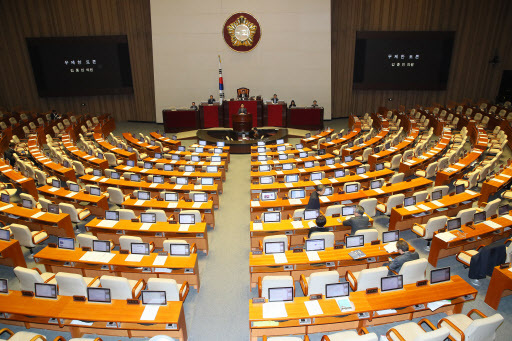Filibuster against election reform continues for 2nd day
By Ock Hyun-juPublished : Dec. 24, 2019 - 18:10
Lawmakers from rival political camps took to the parliamentary podium for a marathon, relayed speech, as a filibuster continued into the second consecutive day Tuesday over a proposed reform of election rules.

The main opposition Liberty Korea Party began the filibuster at the National Assembly on Monday night in an attempt to block the passage of the ruling Democratic Party-led election law revision.
Speaker Moon Hee-sang introduced the bill for a parliamentary vote earlier in the day after five groups, excluding the Liberty Korea Party, reached a final agreement on how to allocate parliamentary seats after a ballot, as well as a prosecution reform plan.
The bills are to be put to a vote automatically when the current extraparliamentary session ends Wednesday, and are likely to pass despite the Liberty Korea Party’s resistance.
The main opposition party is against the election reform plan, fearing it will win fewer seats.
The National Assembly currently has 300 members -- 253 elected in single-seat, first-past-the-post constituencies and 47 members by proportional representation. Koreans cast two ballots in general elections: one for constituency seats and one for proportional representation slots.
The proposed bill is designed to alter the way 30 of the 47 proportional seats are allocated. A new calculation system will be applied to give more proportional representation seats to parties that win fewer constituency seats despite getting more actual votes.
While continuing the filibuster, the conservative Liberty Korea Party made it official Monday that it will set up a one-off “satellite” party and handle the upcoming April 15 elections as two entities, a clear manipulation of the envisioned new seat distribution system.
It claimed the manipulation will clearly show how “unconstitutional and uncivilized” the revision is. With two entities -- one fielding only constituency candidates and the other only proportional representation candidates -- the conservative bloc could theoretically secure more seats.
The minor parties, on the other hand, support the bill as the system could help them expand their presence in Korean politics.
The ruling party is also expected to lose seats under the system, but it agreed to the election reform in return for the minor parties’ support for prosecution reform bills -- setting up an independent body tasked with investigating corruption by high-ranking officials as well as handing over more investigative power to the police.
If the bill passes, the new mixed-member proportional representation system will apply in the April 15 general elections.
There has been criticism that the existing single-member district system mostly benefits the two largest parties, solidifying deeply rooted regionalism and failing to represent diverse electorate groups.
In April, the Democratic Party, the three minor parties -- the minor conservative Bareunmirae Party, the liberal Party for Democracy and Peace and the progressive Justice Party -- reached a tentative deal on electoral reform and placed the reform bills on the fast track.
The filibuster is expected to continue until the end of the current extraordinary session at midnight Wednesday.
(laeticia.ock@heraldcorp.com)
-
Articles by Ock Hyun-ju











![[Today’s K-pop] BTS pop-up event to come to Seoul](http://res.heraldm.com/phpwas/restmb_idxmake.php?idx=644&simg=/content/image/2024/04/17/20240417050734_0.jpg&u=)





![[KH Explains] Hyundai's full hybrid edge to pay off amid slow transition to pure EVs](http://res.heraldm.com/phpwas/restmb_idxmake.php?idx=652&simg=/content/image/2024/04/18/20240418050645_0.jpg&u=20240419100350)

![[Today’s K-pop] Zico drops snippet of collaboration with Jennie](http://res.heraldm.com/phpwas/restmb_idxmake.php?idx=642&simg=/content/image/2024/04/18/20240418050702_0.jpg&u=)